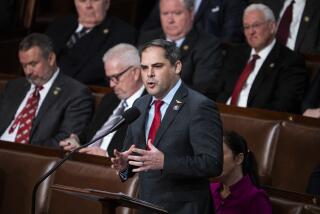New Initiative by Oil Firm Supporters Fuels Drilling War
- Share via
The political war over proposed oil drilling beneath the Pacific Palisades escalated dramatically Wednesday as a citizens’ committee financed by Occidental Petroleum Corp. launched its own initiative, directly countering another initiative that would ban drilling along Los Angeles’ shoreline.
The new initiative, its backers say, would enable the oil company to sink its wells near Will Rogers State Beach, and at the same time require that a portion of the city’s revenues from the project be spent on bolstering police and toxics enforcement efforts.
But opponents of Occidental’s drilling plan quickly labeled the new initiative a ruse. “This is a deliberate attempt to mislead the voters,” said City Councilman Marvin Braude, co-author of the anti-coastal drilling initiative with Councilman Zev Yaroslavsky.
“Occidental is for oil drilling on the beach. Our initiative is against it,” Yaroslavsky said. “I think people are smart enough to see through this scam.”
The competing initiatives--both of which claim to be pro-environment--are likely to confuse many voters. If both qualify for the November ballot--more than 69,000 voter signatures are needed for each--there is the possibility of both measures winning at the polls. Should that happen, the measure with the most “yes” votes would prevail.
3Political adviser Mickey Kantor, attorney for the Occidental-backed group, which calls itself the Los Angeles Public and Coastal Protection Committee, brushed aside suggestions that the tactic is intended to further muddle what is already a complicated, contentious debate.
The new initiative is needed, Kantor said, both to highlight the public benefits of oil production and dispel misconceptions that Occidental intends to drill in Santa Monica Bay. “This is an instance where the private interests of a company and the public’s interest coincide,” Kantor said.
In trying to link the Palisades issue to the desire for more police, the pro-drilling committee is mingling two of the most emotional, politically charged issues in the city. To underscore this point, the committee announced its initiative in a press conference held outside Parker Center, the Los Angeles police headquarters.
Among the committee members who appeared were William Robertson, AFL-CIO regional executive secretary, former Police Chief Tom Reddin and prominent black minister H. H. Brookins. Recent financial disclosure statements showed that the committee had raised $35,000 in December, all of it from Occidental.
‘Important City Tradition’
Their initiative, Robertson said, “represents the reaffirmation of an important city tradition. This is a tradition of sharing and acting in the public interest.”
Robertson, in a prepared statement, maintained that the Palisades project would provide the city with $100 million to $200 million in taxes, royalties and fees annually. The project, Robertson said, could potentially “fund up to 100 new police officers over the next 25 years,” while also providing funds for schools, parks and public works projects. The initiative also would impose a fee of seven cents per barrel to be used for increased toxics enforcement.
The Occidental-backed initiative calls for the City Council to reaffirm its opposition to offshore oil production in the Santa Monica Bay. It also stipulates that the Palisades’ drill site--a 2.5-acre patch of land across Pacific Coast Highway from Will Rogers State Beach-- would be dedicated as a city park when oil production ceases.
Thus crafted, the pro-drilling initiative is pro-police, pro-environment, pro-education and pro-parks, Kantor asserted. “Those who oppose it are opposed to those items,” he said.
‘An Elitist Approach’
Committee members characterized opponents of the Occidental project as a relatively small group of Palisades residents. Brookins said they are taking “an elitist approach,” noting that other drill sites operate safely elsewhere in the city.
But opponents of Occidental’s plans argued that the initiative’s promise of up to 100 police officers is artificial and overblown.
Kantor suggested that 100 officers could be funded for $6 million per year. Yaroslavsky, chairman of the council’s finance committee, said the cost would be $7.5 million. Moreover, Yaroslavsky said, it is uncertain how much oil is beneath the Palisades, and how much money might be raised.
The City Council recently announced plans to add 400 officers to the police force--without Occidental’s help, Yaroslavsky noted. Even if the production surpassed the highest estimates, the oil revenue designated for police would comprise only a small portion of the total police budget, Yaroslavsky said. The vast majority of the budget would remain subject to the control of the mayor and council, so there is no guarantee that the oil revenues would result in more police, he said.
“Only one thing is guaranteed in their initiative--and that’s that Occidental is going to have the right to drill,” Yaroslavsky said.
The prospect of more police, Braude said, is “an outrageous bribe.”
More to Read
Sign up for Essential California
The most important California stories and recommendations in your inbox every morning.
You may occasionally receive promotional content from the Los Angeles Times.










